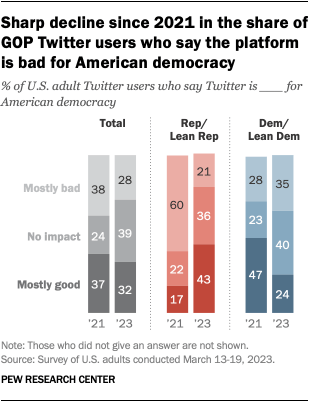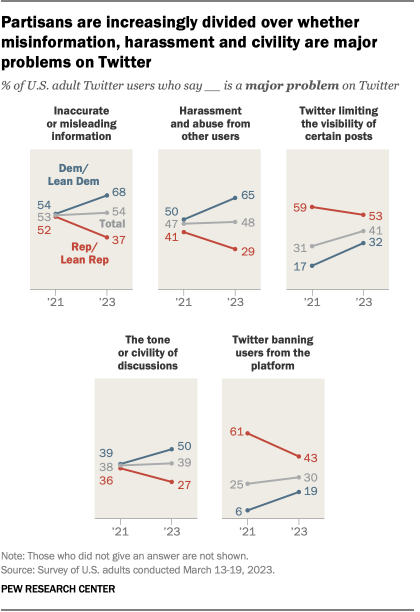After Musk’s takeover, big shifts in how Republican and Democratic Twitter users view the platform
BY MONICA ANDERSONTwo years ago, a majority of Republican Twitter users in the United States said the site had a bad impact on American democracy. But today, following Elon Musk’s takeover of Twitter, their views have become much more positive, while those of their Democratic counterparts have grown more negative.
How we did this

The share of Republican and Republican-leaning Twitter users who say the platform is mostly bad for American democracy has dropped from 60% in 2021 to 21% today, according to a Pew Research Center survey of U.S. adults conducted March 13-19, 2023. At the same time, the share of Republican Twitter users who say the site is mostly good for democracy has risen from 17% to 43%.
Democrats’ views have moved in the opposite direction. The percentage of Democratic and Democratic-leaning Twitter users who say the platform is good for American democracy has decreased from 47% to 24% in the past two years, while the share who say it is bad for democracy has increased – though more modestly – from 28% to 35%.
Still, growing shares in both parties say Twitter isn’t impacting American democracy. In 2021, roughly a quarter each of Republican and Democratic Twitter users said the site had no impact on American democracy. Those shares increased to 36% among GOP users and 40% among Democratic users in the latest survey.
Twitter has undergone several prominent changes in the past year, ushered in by Musk’s $44 billion acquisition of the site last fall. Musk has been a vocal advocate for preserving free speech on the site, reinstating banned users such as former President Donald Trump and taking on “cancel culture.” But critics have raised concerns that these changes could lead to misinformation and harassment going unchecked on the site.
In addition to asking Twitter users about the site’s impact on democracy, the Center’s new survey measures their views about potential issues that may occur on the platform. It finds that Democratic and Republican users are growing further apart in their worries about misinformation, harassment and civility.

Democratic users are now far more likely than Republican users to say inaccurate or misleading information (68% vs. 37%), and the tone or civility of discussions (50% vs. 27%) are major problems on Twitter. Democratic Twitter users have become more likely to say each of these things since 2021, while Republican users have become less likely to do so.
There is also a widening partisan gap in assessing the severity of harassment on the platform. Roughly two-thirds of Democratic users (65%) say harassment and abuse from other users is a major problem on Twitter, compared with 29% of Republican users – a difference of 36 percentage points. This gap was just nine points in 2021.
Additionally, there has been a double-digit increase in the share of Democratic Twitter users who think limiting the visibility of certain posts and banning users are major problems on the site. Conversely, fewer Republican users cite bans as a substantial issue on Twitter, while the share who name limiting posts’ visibility as a major problem is statistically unchanged since 2021.
Still, these free speech-related concerns remain far more common among Republicans on the platform. Among Twitter users, Republicans are more likely than Democrats to say it’s a major problem that the site limits the visibility of certain posts (53% vs. 32%) and bans users (43% vs. 19%).
Note: Here are the questions used for this analysis, along with responses, and its methodology.
https://www.pewresearch.org/short-r...d-democratic-twitter-users-view-the-platform/
